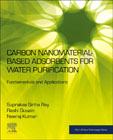
Carbon Nanomaterial-based Adsorbents for Water Purification: Fundamentals and Applications
Ray, Suprakas Sinha
Gusain, Rashi
Kumar, Neeraj
The deterioration of water quality and unavailability of drinkable water are pressing challenges worldwide. The removal of toxic organic and inorganic pollutants from water is vital for a clean environment, as a response to water scarcity. Adsorption-based water technologies are among the most widely used because of their high efficiency and low cost, without relying on a complex infrastructure. In recent years, carbon nanomaterials (CNMs), such as graphene and derivatives, carbon nanotubes, carbon nanofibers, nanoporous carbon, fullerenes, graphitic carbon nitride, and nanodiamonds have been extensively exploited as adsorbents due to their extraordinary surface properties, ease of modification, large surface area, controlled structural varieties, high chemical stability, porosity, low density, ease of regeneration, and reusability. This book provides a thorough overview of the state of the art in carbon nanomaterials as they are used for adsorption applications in water purifications, as well as addressing their toxicological challenges. This volume primarily explores the fundamentals of adsorption, its mechanical aspects, synthesis and properties of CNMs, and adsorption performances of CNMs and their nanocomposites with organic and inorganic materials. Structural engineering and activation processes produce materials with enhanced adsorptive properties and separation efficiencies. Furthermore, the formation of CNMs with 2D and 3D macro-and microstructures and high porosities is a potential approach to improve adsorption performances and extend CNM use at the industrial level. The book also addresses important issues regarding these adsorbents that potentially affect future research and industrial applications of carbon-based nanoadsorbents in water security. Presents advances in multifunctional 3D superstructures of carbon nanomaterials and their composites for adsorption applicationsOutlines the fundamentals on synthesis and characterization techniques of carbon-based nanostructures and their compositesAssesses the major toxicological challenges in using nanostructured materials as adsorbents for water purification INDICE: 1. Introduction 2. Classification of water contaminants 3. Water purification using various technologies and their advantages and disadvantages 4. Adsorption in context of water purification 5. Adsorption equilibrium isotherms, kinetics and thermodynamics 6. Effect of reaction parameters on the adsorption 7. Carbon nanomaterials: Synthesis, functionalization and properties 8. Zero-dimensional carbon nanomaterials-based adsorbents 9. One-dimensional carbon nanomaterials-based adsorbents 10. Two-dimensional carbon nanomaterials-based adsorbents 11. Multifunctional three-dimensional carbon nanomaterials-based adsorbents 12. Biopolymer functionalized carbon nanomaterials-based adsorbents 13. Conducting polymer functionalized carbon nanomaterials-based adsorbents 14. Carbon-based nano/micromotors for adsorption 15. Regeneration and recyclability of carbon nanomaterials after adsorption 16. Toxicity of carbon nanomaterials 17. Outlook and future research, development, and innovation directions
- ISBN: 978-0-12-821959-1
- Editorial: Elsevier
- Encuadernacion: Rústica
- Páginas: 400
- Fecha Publicación: 01/07/2020
- Nº Volúmenes: 1
- Idioma: Inglés
